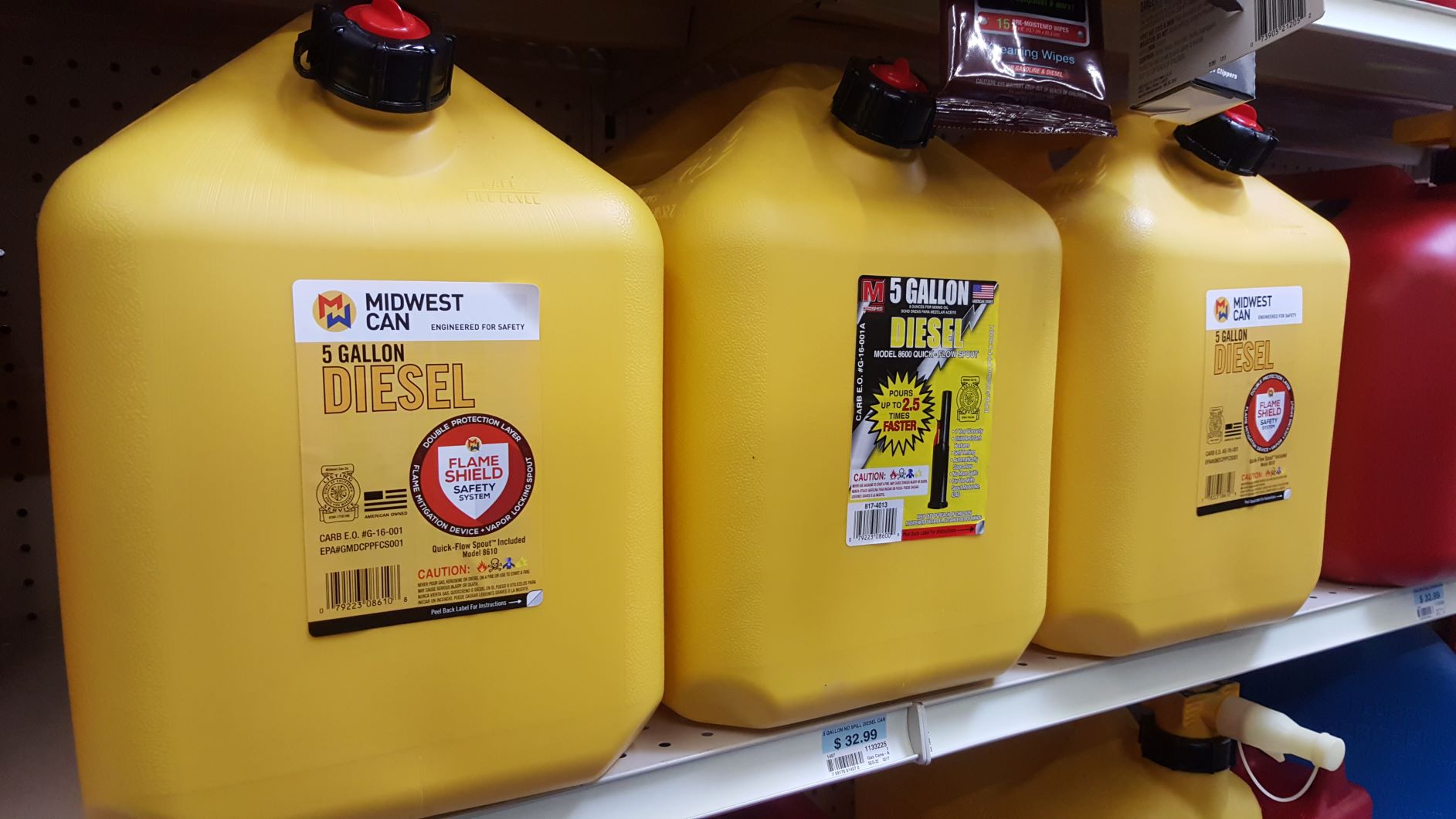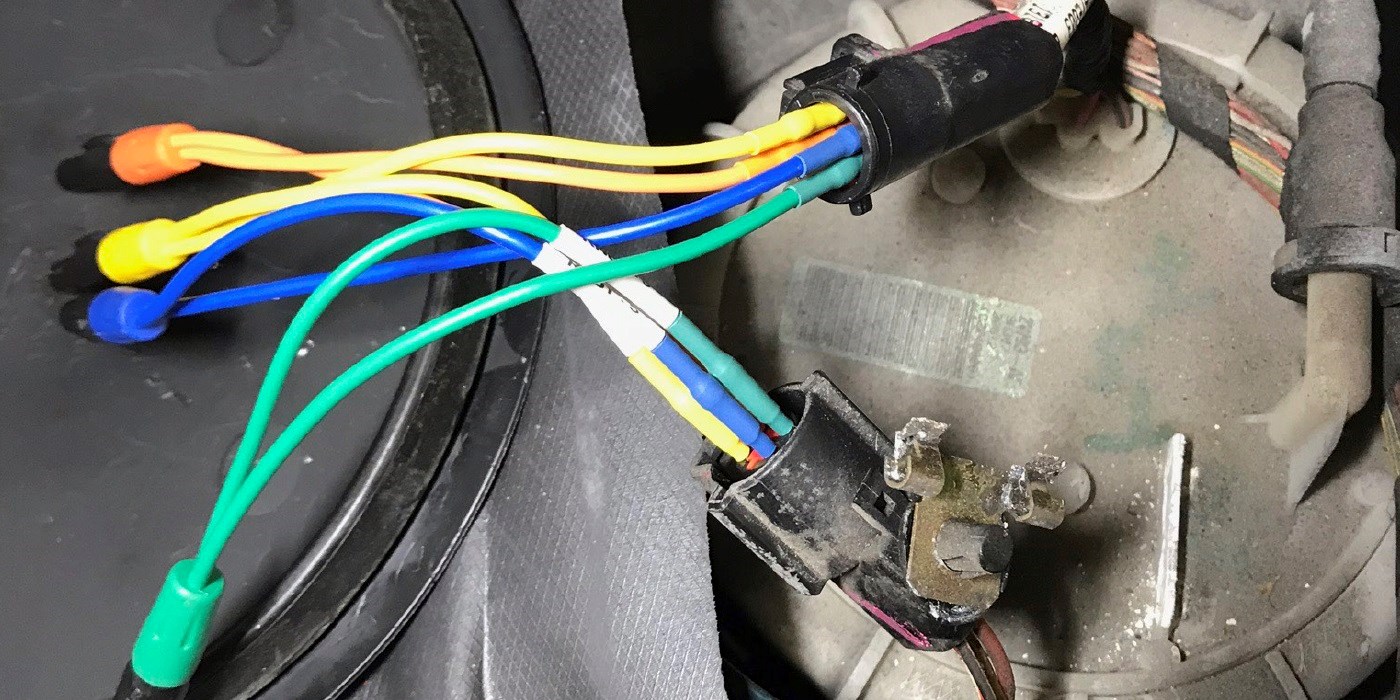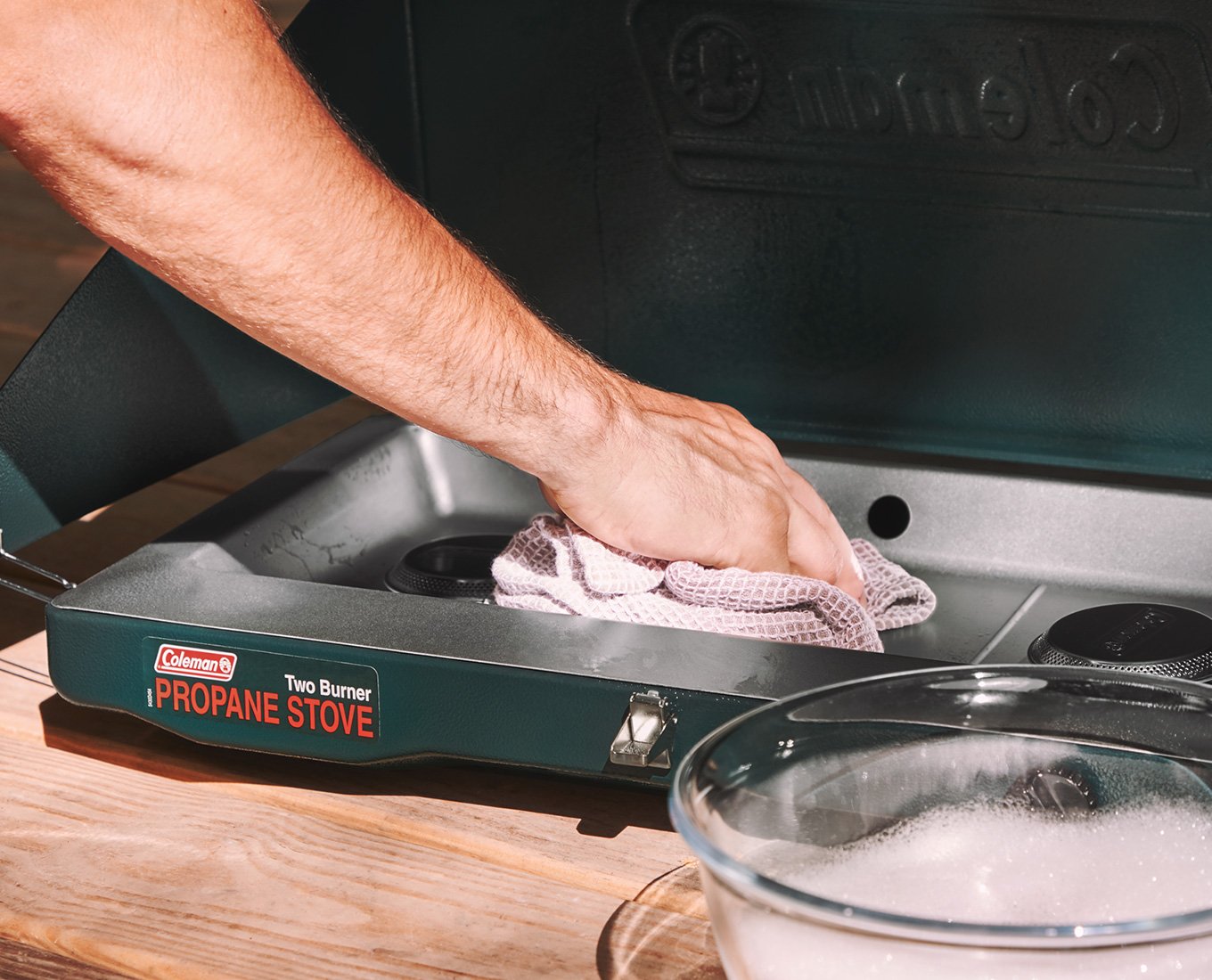

Articles
How To Store Diesel Fuel At Home
Modified: December 7, 2023
Learn the safe and proper way to store diesel fuel at home in this informative article. Protect your investment and ensure the longevity of your fuel supply.
(Many of the links in this article redirect to a specific reviewed product. Your purchase of these products through affiliate links helps to generate commission for Storables.com, at no extra cost. Learn more)
Introduction
Storing diesel fuel at home can be a convenient option for those who rely on generators or have equipment that requires diesel-powered engines. However, it is important to approach this task with caution and adhere to proper safety guidelines. This article will guide you through the steps of safely storing diesel fuel at home, ensuring that you are prepared for emergencies and maintaining the quality of the fuel.
Before you begin, it is essential to understand that handling diesel fuel can be hazardous if proper precautions are not taken. Diesel fuel is flammable and can release toxic fumes, making safety a top priority throughout the storage process. By following the necessary guidelines and taking necessary safety precautions, you can ensure that the fuel remains secure and your home and surroundings are protected.
In this article, we will cover important aspects of storing diesel fuel at home, including the selection of a suitable storage container, the location for storage, cleaning and preparing the container, maintaining fuel quality, filling and storing the fuel, regular maintenance and inspection, and emergency preparedness.
By following these guidelines, you can store diesel fuel at home safely and efficiently, ensuring that you have a reliable source of fuel when you need it most.
Key Takeaways:
- Safety is paramount when storing diesel fuel at home. From understanding regulations to proper ventilation and labeling, following safety precautions minimizes risks and ensures the well-being of yourself and those around you.
- Selecting the right storage container, choosing a suitable location, and maintaining fuel quality through additives and regular inspections are essential for safe and efficient diesel fuel storage at home. Prioritize safety, cleanliness, and emergency preparedness.
Read more: How To Store Fuel Long Term
Safety Precautions
When it comes to storing diesel fuel at home, safety should always be your top priority. Here are some important safety precautions to follow:
- Read and understand the regulations: Familiarize yourself with local regulations and guidelines regarding the storage of diesel fuel at home. Different areas may have specific requirements that you must adhere to.
- Use proper ventilation: Ensure that the storage area is well-ventilated to prevent the build-up of fumes. Install an appropriate exhaust system to ensure that any fumes or gases are safely released outdoors.
- Keep away from ignition sources: Store the fuel away from any potential sources of ignition, such as open flames, sparks, or electrical equipment.
- Invest in fire safety equipment: Have fire extinguishers, fire blankets, and other fire safety equipment readily available near the storage area.
- Label containers: Clearly label all containers holding diesel fuel with the appropriate warnings, handling instructions, and contents.
- Secure the area: Ensure that access to the storage area is restricted to authorized personnel only. This will help prevent accidents and unauthorized use of the fuel.
- Avoid overfilling containers: Do not fill containers beyond their recommended capacity. Overfilling can lead to spills and increase the risk of fire hazards.
- Handle with care: Use proper equipment and follow safe handling procedures when transferring or storing diesel fuel. Avoid any rough handling or dropping of containers.
- Store away from children and pets: Keep diesel fuel out of the reach of children and pets to prevent accidental ingestion or exposure.
- Be prepared for emergencies: Have an emergency plan in place in case of spills, leaks, or other accidents. Follow proper protocols to contain and clean up any fuel spills.
By adhering to these safety precautions, you can minimize the risks associated with storing diesel fuel at home and ensure the well-being of yourself and those around you.
Choosing the Storage Container
Choosing the right storage container is crucial for the safe and efficient storage of diesel fuel at home. Here are some factors to consider when selecting a container:
- Material: Opt for containers that are specifically designed for storing flammable liquids like diesel fuel. The most common materials used for diesel fuel storage containers are steel, polyethylene, and fiberglass. Each material has its advantages and considerations, so choose one that suits your needs and meets safety regulations.
- Size and capacity: Determine the amount of diesel fuel you need to store and choose a container with an appropriate size and capacity. Consider factors such as available space, usage requirements, and regulatory restrictions on maximum container sizes.
- Sealing capabilities: Ensure that the container has a secure and reliable sealing mechanism to prevent any leaks or spills. Look for containers with a tight-fitting lid or closure system that effectively seals the fuel inside.
- UV resistance: If the storage container will be kept outdoors, choose a container that is UV resistant. UV rays can degrade the container material over time, so selecting a UV-resistant option will help prolong the lifespan of the container.
- Compatibility: Ensure that the container is compatible with diesel fuel. Some materials may react with diesel and compromise the fuel quality. Refer to the manufacturer’s instructions and specifications to ensure compatibility.
- Accessibility: Consider how easily you can access the fuel in the container. Look for features such as a built-in pump, spigot, or other dispensing mechanisms that allow for easy and controlled fuel extraction.
- Portability: If you require portability, choose a container that is designed for easy transportation. Look for handles, wheels, or other features that make it convenient to move the container when necessary.
Keep in mind that it is recommended to have separate containers for storing diesel fuel and any other hazardous materials to avoid any contamination or mixing. Additionally, ensure that the storage container you choose meets the necessary safety standards and regulations set by your local authorities.
By carefully considering these factors, you can select a storage container that is safe, reliable, and suitable for storing diesel fuel at home.
Location Selection
Choosing the right location for storing diesel fuel at home is essential for ensuring safety and accessibility. Here are some factors to consider when selecting a location:
- Outdoor vs. indoor: Decide whether you will store the diesel fuel outdoors or indoors. If possible, storing the fuel outdoors in a designated area is typically recommended to minimize the risks associated with storing flammable liquids indoors.
- Accessibility: Select a location that allows for easy access to the storage container. Consider factors such as proximity to the equipment or generator that requires diesel fuel, as well as the convenience of refilling the container.
- Distance from ignition sources: Ensure that the chosen location is far enough away from any potential sources of ignition, such as open flames, electrical equipment, or heat sources.
- Fire safety: Keep in mind the fire safety precautions and regulations in your area. Choose a location that facilitates fire prevention and emergency response, such as easy access for firefighting equipment or fire extinguishers.
- Ventilation: Opt for a well-ventilated location that allows for the dispersion of fumes. Adequate ventilation helps reduce the risk of fume accumulation and promotes air circulation.
- Drainage: Select a location that has proper drainage to prevent water accumulation. Water can contaminate the fuel and cause damage to the storage container.
- Security: Consider the security of the chosen location. Ensure that the area is secure and inaccessible to unauthorized individuals to prevent tampering or theft of the fuel.
- Environmental impact: Take into account the potential environmental impact of storing diesel fuel at the chosen location. Avoid areas near water sources or areas prone to soil contamination.
- Regulatory compliance: Familiarize yourself with any local regulations or restrictions regarding the storage of diesel fuel. Ensure that the chosen location complies with all applicable regulations.
Remember, safety should always be your top priority when selecting a location for diesel fuel storage. By considering these factors and adhering to local regulations, you can choose a suitable location that ensures the security, accessibility, and safety of the stored diesel fuel.
Cleaning and Preparing the Container
Before storing diesel fuel in a container, it is crucial to ensure that the container is clean and properly prepared. Here are the steps to clean and prepare the container:
- Inspect the container: Start by inspecting the storage container for any damage or signs of wear and tear. Ensure that there are no cracks, leaks, or weakened areas that may compromise the integrity of the container.
- Empty the container: If the container previously held any other substances, ensure that it is completely emptied and free of any residue. Thoroughly clean the container, removing any dirt, debris, or remnants of the previous material.
- Use appropriate cleaning agents: Use a mild detergent or specialized cleaning solution recommended for the type of container material. Avoid using harsh chemicals or abrasive cleaners that may react with or damage the container.
- Scrub the container: Scrub the inside of the container using a non-abrasive brush or sponge. Pay close attention to the corners, seams, and bottom of the container, as these areas are prone to accumulation of dirt and residue.
- Rinse and dry: Thoroughly rinse the container with clean water to remove any cleaning solution or residue. Allow the container to air dry completely before proceeding to the next step.
- Inspect for cleanliness: Once the container is dry, inspect it again to ensure that it is clean and free of any contaminants. Look for any remaining dirt, residue, or signs of damage.
- Prepare for fuel storage: Now that the container is clean, it is time to prepare it for diesel fuel storage. If necessary, install any additional equipment such as fuel filters or monitoring devices as recommended by the manufacturer or regulatory guidelines.
- Label the container: Clearly label the container as “Diesel Fuel” to avoid any confusion and potential mixing of fuels. Include additional information such as the date of storage or any additives used, if applicable.
By following these steps, you can ensure that the storage container is clean, free from contaminants, and ready to store diesel fuel safely and effectively. Proper cleaning and preparation help maintain the fuel quality and prolong the lifespan of the storage container.
Store diesel fuel in a well-ventilated, cool, and dry area away from direct sunlight and sources of heat or ignition. Use approved containers and consider adding a fuel stabilizer to prolong its shelf life.
Read more: How To Store Diesel Long Term
Fuel Quality and Additives
The quality of diesel fuel is essential for optimal engine performance and longevity. Additionally, the use of additives can further enhance fuel quality and address specific needs. Here are some considerations for fuel quality and additives:
Fuel Quality:
When storing diesel fuel at home, it is crucial to maintain its quality to ensure optimal performance. Here are some tips for maintaining fuel quality:
- Use fresh fuel: Whenever possible, use fresh diesel fuel to minimize the risk of fuel degradation. Diesel fuel can degrade over time, leading to lower performance and potential engine issues. Rotate your fuel stock regularly to ensure you are using the freshest fuel available.
- Choose high-quality fuel: Purchase diesel fuel from reputable suppliers known for providing high-quality products. Quality fuel ensures better combustion, engine efficiency, and reduced emissions.
- Keep the fuel clean: Prior to storing diesel fuel, ensure that the storage containers and handling equipment are clean to prevent contamination. Dirt, water, or other contaminants can compromise the fuel quality.
- Monitor fuel temperature: Avoid exposing diesel fuel to extreme temperatures, as this can impact quality. Store the fuel in a cool, dry area to maintain its stability.
- Regularly test the fuel: Perform regular fuel testing to monitor the quality of the diesel fuel. Testing can identify any contaminants, water accumulation, or degradation that may necessitate fuel treatment or disposal.
Additives:
Additives can be used to enhance the performance and stability of diesel fuel. Here are some common types of additives and their benefits:
- Stabilizers: Fuel stabilizers help prevent fuel degradation and oxidation caused by exposure to air and environmental factors. They can extend the shelf life of diesel fuel and improve its storage stability.
- Biocides: Biocides are used to prevent the growth of bacteria, fungi, and other microbial contaminants in diesel fuel. They inhibit the formation of sludge and help preserve fuel quality.
- Cetane improvers: Cetane improvers enhance the combustion efficiency of diesel fuel, resulting in improved engine performance, reduced emissions, and smoother operation.
- Anti-gelling agents: In cold climates, anti-gelling agents can prevent the fuel from solidifying or gelling, which can clog fuel filters and disrupt fuel flow. They help improve cold-weather performance.
- Corrosion inhibitors: Corrosion inhibitors protect fuel storage containers and equipment from corrosion caused by the interaction of diesel fuel with metals. They help prolong the lifespan of the storage system.
When using additives, it is vital to follow the manufacturer’s instructions and recommended dosage to avoid overuse or potential adverse effects. Consider consulting with professionals or experts in fuel additives for guidance on the specific needs of your diesel fuel.
By maintaining fuel quality and using appropriate additives, you can ensure that the stored diesel fuel remains in optimal condition and performs reliably when you need it.
Filling and Storing Diesel Fuel
Proper filling and storing of diesel fuel is crucial to maintain its quality, prevent spills, and ensure safety. Here are the steps to follow when filling and storing diesel fuel:
- Prepare the container: Ensure that the storage container is clean, dry, and in good condition. Check for any signs of damage or leaks before filling it with diesel fuel.
- Use a funnel: Place a funnel into the container’s opening to avoid spills or splashing while pouring the fuel. This helps to control the flow and minimize the risk of contamination.
- Handle the fuel carefully: When pouring the fuel, handle the container with care to prevent spills or splashes. Do not overfill the container; leave some space for fuel expansion due to temperature changes.
- Tightly seal the container: Once the fuel is poured, securely seal the container to prevent evaporation, contamination, or leakage. Ensure that the lid or closure is tight and secure.
- Store the container properly: Place the container in a designated storage area that meets the safety and environmental regulations discussed earlier. Keep the container away from sources of heat, direct sunlight, or extreme temperatures.
- Keep records: Maintain records of the quantity, date, and any additives used during the fuel filling process. This helps in monitoring fuel consumption, rotation, and overall fuel management.
- Consider fuel rotation: If you have multiple containers of diesel fuel, implement a rotation system to use older fuel first. This ensures that the fuel remains fresh and reduces the risk of fuel degradation.
- Monitor and inspect regularly: Regularly inspect the containers for any signs of damage, leaks, or tampering. Also, monitor the fuel level and quality periodically to ensure proper storage and detect any issues in a timely manner.
It is important to note that diesel fuel may have a limited shelf life, typically ranging from 6 to 12 months, depending on various factors such as temperature, fuel quality, and additives used. Regularly monitor and assess the fuel’s condition to determine if it needs to be used within a specific duration or if treatment or disposal is necessary.
By following these steps and best practices, you can safely fill and store diesel fuel, ensuring its quality and availability when needed.
Regular Maintenance and Inspection
To ensure the safe storage of diesel fuel at home and maintain its quality, regular maintenance and inspections are necessary. Here are the key aspects of regular maintenance and inspection:
- Visual inspection: Conduct regular visual inspections of the storage containers for any signs of damage, leaks, or corrosion. Look for cracks, dents, or any other abnormalities that may compromise the integrity of the containers.
- Check seals and closures: Inspect the seals and closures of the containers to ensure they are tight and in good condition. Replace any worn-out or damaged seals to prevent any potential leaks or evaporation of the fuel.
- Monitor fuel levels: Regularly monitor the fuel levels in the storage containers and ensure that they are within a safe range. Be aware of any sudden drops in fuel levels, which may indicate a potential leak or unauthorized usage.
- Temperature control: Maintain proper temperature control in the storage area to prevent extreme temperature fluctuations, which can degrade the quality of the fuel. Avoid storing the fuel in areas that are subject to direct sunlight or extreme heat sources.
- Water accumulation: Check for any water accumulation in the fuel storage containers. Water can contaminate the fuel and lead to engine issues. If any water is present, take appropriate measures to remove it or consider using fuel additives that help separate water from the fuel.
- Fuel testing: Periodically test the fuel for quality and contamination. Fuel testing kits are available to check for water content, microbial growth, and other impurities. Testing the fuel helps identify any issues and allows for timely action to maintain fuel quality.
- Review maintenance records: Review the maintenance history and records of the storage containers and any associated equipment. This helps identify any trends or recurring issues and ensures that maintenance tasks are performed on schedule.
- Consider professional inspection: If you are unsure about the condition of the storage containers or need a comprehensive assessment, consider engaging a professional to conduct an inspection. They can identify any potential concerns and provide expert recommendations.
Regular maintenance and inspections are crucial to ensure the longevity of the storage containers, prevent fuel degradation, and detect any potential issues early on. By staying proactive and taking necessary maintenance measures, you can ensure the safe and efficient storage of diesel fuel at home.
Emergency Preparedness
Being prepared for emergencies is essential when storing diesel fuel at home. Here are some key steps to take to ensure you are ready for any unforeseen situations:
- Create an emergency plan: Develop an emergency plan specific to fuel-related incidents. Include steps to be taken in case of spills, leaks, or other accidents related to diesel fuel storage. Assign roles and responsibilities to individuals involved in implementing the plan.
- Train and educate: Educate household members or employees about the emergency plan and proper procedures for handling fuel-related emergencies. Provide training on how to use fire extinguishers and other safety equipment.
- Keep emergency contacts: Maintain a list of emergency contacts, including local fire services, hazardous materials response teams, and relevant helpline numbers. Store this information in a readily accessible location.
- Have appropriate firefighting equipment: Keep fire extinguishers near the storage area and ensure they are appropriate for handling flammable liquid fires. Regularly check the extinguishers and have them inspected as per the manufacturer’s guidelines.
- Invest in spill containment materials: Keep spill containment materials such as absorbent pads, spill kits, and drain covers nearby. These materials can help contain and control spills to minimize environmental impact and potential hazards.
- Train in spill response: Train individuals on how to respond to fuel spills or leaks safely. This includes using appropriate personal protective equipment (PPE), containing the spill, and following proper disposal procedures in accordance with local regulations.
- Regularly inspect storage containers and fittings: Conduct routine inspections of the storage containers, fittings, and equipment to ensure they are in good condition. Look for any signs of leaks, corrosion, or damage that may require immediate attention.
- Establish evacuation routes: Identify evacuation routes from the fuel storage area in case of an emergency. Ensure that all individuals are aware of these routes and conduct regular drills to practice evacuations.
- Consider environmental impacts: Be mindful of the potential environmental impact of fuel spills. Develop measures to prevent spills from reaching water sources or soil. Have appropriate containment measures in place such as dikes or berms to limit the spread of the spilled fuel.
- Stay updated on regulations: Stay informed about local regulations, safety guidelines, and best practices regarding the storage of diesel fuel. Comply with all relevant regulations to ensure the safety of individuals and the environment.
By being prepared and having a well-defined emergency plan in place, you can minimize risks, protect yourself, and effectively respond to any emergencies that may arise during the storage of diesel fuel at home.
Read more: What Is A Gel Fuel Fireplace
Conclusion
Storing diesel fuel at home can provide convenience and peace of mind, especially for those who rely on generators or have equipment that requires diesel-powered engines. However, it is crucial to approach this task with utmost caution and follow proper safety guidelines to ensure the safety of yourself, your property, and the environment.
In this article, we have covered the various aspects of storing diesel fuel at home. We began by emphasizing the importance of safety precautions, ensuring that you are well-aware of the potential hazards and regulations associated with storing flammable liquids.
We then discussed the selection of a suitable storage container, considering factors such as material, size, sealing capabilities, and compatibility with diesel fuel. Choosing the right container is essential for maintaining the quality and integrity of the fuel.
The selection of a proper location for storing diesel fuel is equally crucial. We highlighted the importance of considering accessibility, distance from ignition sources, ventilation, drainage, and compliance with regulatory requirements when choosing a location.
Cleaning and preparing the storage container is a fundamental step in ensuring the integrity of the stored fuel. We provided guidance on inspecting, cleaning, rinsing, and drying the container to eliminate any contaminants or residues.
Next, we discussed the significance of fuel quality and the potential use of additives to enhance the performance and stability of diesel fuel. We emphasized the importance of using fresh fuel, choosing high-quality suppliers, monitoring fuel temperature, and regularly testing the fuel to ensure its quality.
Filling and storing diesel fuel require careful handling and proper sealing to prevent spills and contamination. We outlined the steps of filling the container, sealing it tight, and storing it in a designated area that meets safety and environmental regulations.
Regular maintenance and inspections are essential to ensure the longevity of the storage containers and the quality of the fuel. We discussed visual inspections, checking seals and closures, monitoring fuel levels, maintaining temperature control, and regular fuel testing as part of a comprehensive maintenance routine.
Finally, we emphasized the importance of emergency preparedness. Developing an emergency plan, training individuals, having appropriate firefighting equipment, and staying updated on regulations are vital in handling any emergencies that may arise during the storage of diesel fuel.
By following the guidelines provided in this article, you can safely and efficiently store diesel fuel at home, ensuring a reliable source of fuel when needed and minimizing any risks associated with its storage. Be proactive, stay informed, and prioritize safety to enjoy the benefits of having diesel fuel readily available at home.
Frequently Asked Questions about How To Store Diesel Fuel At Home
Was this page helpful?
At Storables.com, we guarantee accurate and reliable information. Our content, validated by Expert Board Contributors, is crafted following stringent Editorial Policies. We're committed to providing you with well-researched, expert-backed insights for all your informational needs.














0 thoughts on “How To Store Diesel Fuel At Home”